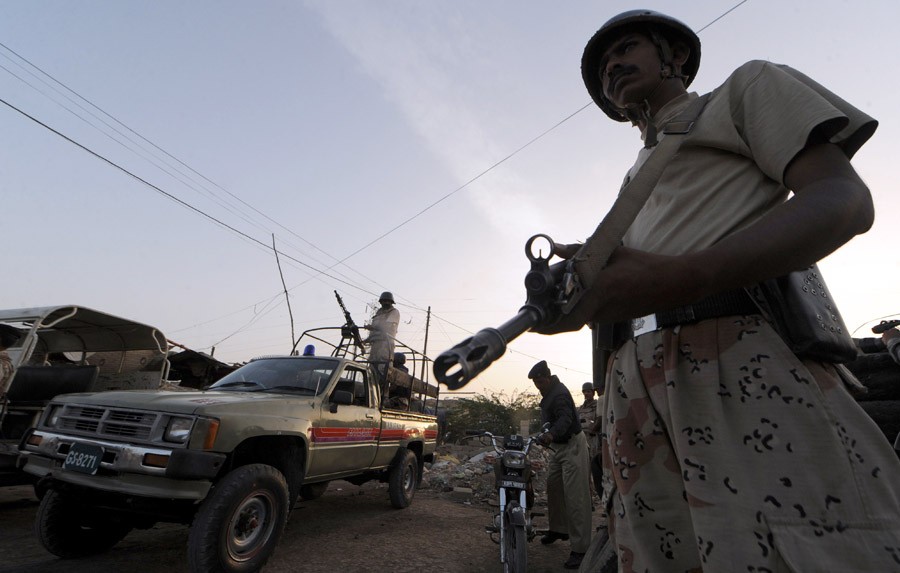
Since the launch of the Karachi operation in 2013, the city is more secure and peaceful

"The Sindh Rangers arrested five suspects from Gulshan-e-Maymar, Mehmoodabad and Jamshed Road neighbourhood in Karachi, involved in a number of street crimes and dacoities. The suspects included: Muhammad Zareen, Muhammad Islam, Muhammad Asim, Shehroz Shahid alias Kaala and Muhamamd Faizan alias Chooha," says a statement on a raid conducted by the paramilitary forces on September 18, 2018 in the provincial metropolis of Sindh.
With the Rangers-led targeted operation aimed at restoring peace in Karachi entering its sixth year, there is a marked improvement in the overall law and order situation in the country’s commercial capital. Even fatalities from political violence and gang wars have sharply declined.
Karachi was gripped by worst forms of violence between 2007 and 2013, when thousands of people fell victims to terrorism, target killings and sectarian attacks. Year 2013 was the bloodiest, as 2,700 people got killed, according to official statistics maintained by law enforcement agencies.
On September 5, 2013, then PM Nawaz Sharif’s cabinet gave the green light to launch a major crackdown on various criminal militant groups in Karachi. With the backing of the federal government and the military, the security operation mainly targeted four categories of violent groups: Taliban, sectarian outfits, armed wings of ethno-political parties and criminal gangs operating in Lyari and other parts of the city.
"We have destroyed these groups in the last five years," a senior Rangers’ official, who is not authorised to speak to media, tells TNS.
Various reports by security think tanks mapping violence in Karachi corroborated the Rangers’ claim, and show a significant decrease in target killings in the city.
Since the launch of the operation, various Tehreek-e-Taliban Pakistan (TTP) factions operating in Karachi have been targets of law enforcement agencies. These were extensions of the Swat, Mohmand and South Waziristan chapters of the TTP which had spread out in Karachi after the military launched the operations in Fata in 2009.
Karachi has long been the most active theatre of sectarian violence between Sunni, Deobandi and Shia groups. Tit-for-tat killings have been common. Almost expectedly, and despite the ongoing Rangers’ operation in the city, sectarian violence resurfaced in October 2016, in which several people were killed on sectarian ground and religious gatherings were attacked.
This left a question mark over the three-year-long efforts of the law enforcement agencies, and forced them to launch an across-the-board crackdown on sectarian outfits. The action led to arrests of leaders of Deobandi and Shia groups, and killing of associated militants groups in shootouts led by enforcement agencies.
Lyari, one of the oldest localities in Karachi, was the epicenter of intense warfare between rival criminal gangs. In these horrific gang wars many innocent people were killed. Therefore, the Rangers’ led law enforcement agencies had to take serious action against these networks by target killing gang leaders in 2016.
The militant wings of ethno-political parties, that were instrumental in destroying the peace and order of the city, were also targeted by the law enforcement agencies. Muttahida Qaumi Movement (MQM), the main political party in the city, suffered much from the operation, a large number of its party members were arrested or had to go into hiding to escape detention. The party also claimed that a number of its workers were killed extra-judicially or abducted by law enforcement agencies.
In August 2016, the MQM jumped into crisis far graver than any before it, when its London-based Chief, Altaf Hussain, incited his party workers to attack the media houses. Within hours, Rangers picked up the party’s top brass in Karachi and sealed the party headquarters, Nine Zero, for the first time. The clampdown forced the party’s Pakistan-based leaders to disown Altaf Hussain.
The statistics released by Sindh Rangers on September 5 to explain the five years’ performance show the paramilitary agency has carried out 14,327 raids since the start of the operation in September 2013. During these raids, Sindh Rangers has arrested 10,716 suspects and have handed them over to the police for legal action. Among them, 2,189 were hardcore terrorists while 1,826 were involved in target killings. Also, law enforcement body has claimed to arrest 786 criminals involved in extortions and 193 in kidnapping for ransom.
Sindh Rangers has lost 29 soldiers to the Karachi operation. About 103 Rangers personnel were injured while performing duties.
The report further claims the incidents of kidnapping for ransom, target killings, extortion and other crimes have reduced significantly in the city since the Karachi operation was initiated. The Rangers statistics show terrorist incidents in the city have decreased from 55 and 66 in 2013 and 2014 respectively to zero in 2017 and 2018.
Similarly, the target killing has significantly decreased to 965 and 602 in 2013 and 2014 respectively to 45 and 2 in 2017 and 2018 respectively. The extortion cases from 1,524 and 899 in 2013 and 2014 have come down to 31 in 2018 while kidnapping for ransom has declined from 174 cases in 2013 to 5 in 2018.
The Rangers also recovered 50 rocket launchers, 122 heavy or light machine guns, 1,414 Kalashnikovs, 8,117 pistols and 1,555 rifles since the launch of operation. 1,742 crackers or hand grenades, 28 improvised explosive devices, 901 kilogrammes explosive materials, 16 suicide jackets and 35 RPG-7 rockets have been recovered from the militants in the crackdown as well.
However, street crimes in the metropolis are still posing a great challenge for the law enforcement agencies. Criminals involved in street robberies are committing gun violence if victims offer resistance.
Rights groups such as the Human Rights Commission of Pakistan also corroborated decrease in terrorism in the city, showing their regular concern on human rights violations such as ‘extra-judicial killings’ in the early years of the operation.
‘Reviewing the Karachi Operation’ was one of the nine MoUs agreed on between the MQM-P and Pakistan Tehreek-e-Insaf for forming the federal government. But senior law enforcement officials said the operation will continue like before.